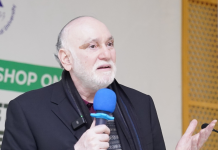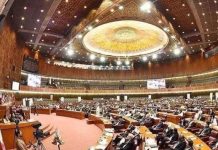ISLAMABAD: Federal Minister for Economic Affairs Omar Ayub Khan will chair the meeting of the Economic Coordination Committee (ECC) today to discuss a 15-point agenda.
The federal government will mull over the imposition of a new tax on sugar-sweetened beverages and tobacco besides reviewing a summary for late payment surcharge for fertilizers factories.
The ECC is likely to approve a technical supplementary grant for the expenditures of the Power Division. Moreover, the ECC will review a summary regarding the fuel adjustment of the electricity distribution companies.
The committee will mull over the available reserves and demand of wheat in the country besides approving the opening of a sixth tender for wheat import. A summary will be presented to provide wheat to Afghanistan.
A summary will come into consideration for the security duty allowance of Pakistan Air Force (PAF) officials.
It is likely that the ECC will approve the restoration of the gas network in those Khyber Pakhtunkhwa (KP) districts that are self-sufficient in oil and gas resources.
The ECC will approve the second phase of the Ehsaas Emergency Cash Program. It will also review the strategic state policy framework in today’s meeting.
Earlier in October, Prime Minister Imran Khan had reconstituted the Economic Coordination Committee (ECC) of the federal cabinet.
Economic Affairs Minister Omar Ayub Khan had replaced Shaukat Tarin as chairman of the ECC in a government notification.
The government had reconstituted the ECC after the end of Shaukat Tarin’s status as federal minister for finance.
Federal ministers of communications and energy have also been members of the 12-member strong ECC.
Federal ministers of industries and production, interior affairs, law and justice, maritime affairs, food security, planning, privatisation, railways and water resources are other members of the cabinet committee.
Shaukat Tarin was appointed Adviser to the PM Imran Khan after his constitutionally mandated six-month tenure as the Minister of Finance expired on October 16.
Under the constitution, a non-elected person can be appointed a federal minister for a maximum period of six months, during which he or she is bound to be elected to the Parliament to continue the office.
Tarin could not get elected to Parliament during the fixed six months period, so he was made the PM’s adviser on finance and revenue to continue leading the government’s economic team.

















